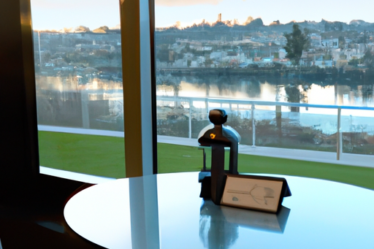
Streamlining Financial Management with P2P Software in the Hotel Industry
The hotel industry is a highly competitive market, and hoteliers are constantly looking for ways to improve their operations and increase their profitability. One area that often presents challenges for hoteliers is financial management. Keeping track of expenses, managing budgets, and ensuring that payments are made on time can be a daunting task. However, with the advent of peer-to-peer (P2P) software, hoteliers now have a powerful tool at their disposal to streamline their financial management processes.
P2P software is a technology that allows individuals or businesses to connect and transact directly with each other, without the need for intermediaries. In the hotel industry, P2P software can be used to automate and simplify various financial management tasks, such as expense tracking, budgeting, and payment processing. By leveraging this technology, hoteliers can save time, reduce costs, and gain better control over their finances.
One of the key benefits of using P2P software in financial management is the ability to track expenses more efficiently. With traditional methods, hoteliers often rely on manual processes to record and categorize expenses, which can be time-consuming and prone to errors. P2P software automates this process by capturing and categorizing expenses in real-time, eliminating the need for manual data entry. This not only saves time but also ensures that expenses are accurately recorded, making it easier for hoteliers to analyze their spending patterns and make informed decisions.
In addition to expense tracking, P2P software also enables hoteliers to create and manage budgets more effectively. With traditional budgeting methods, hoteliers often rely on spreadsheets or other manual tools to create and monitor their budgets. This can be a cumbersome process, especially when there are multiple departments or cost centers involved. P2P software simplifies budgeting by providing a centralized platform where hoteliers can create, track, and update budgets in real-time. This allows for better collaboration and communication among different stakeholders, ensuring that everyone is on the same page when it comes to financial goals and targets.
Furthermore, P2P software streamlines the payment process, making it easier for hoteliers to manage their cash flow. With traditional payment methods, hoteliers often have to deal with paper invoices, checks, and manual approvals, which can be time-consuming and prone to delays. P2P software automates the payment process by allowing hoteliers to send and receive electronic invoices, set up automated payment schedules, and track payment status in real-time. This not only saves time but also reduces the risk of late payments or missed deadlines, helping hoteliers maintain good relationships with their suppliers and vendors.
Overall, P2P software is a game-changer for hoteliers looking to master their 2024 budget. By streamlining financial management processes, hoteliers can save time, reduce costs, and gain better control over their finances. Whether it’s tracking expenses, managing budgets, or processing payments, P2P software provides a comprehensive solution that simplifies and automates these tasks. With the right P2P software in place, hoteliers can focus on what they do best – providing exceptional guest experiences – while leaving the financial management to technology. So, if you’re a hotelier looking to take your financial management to the next level, it’s time to embrace P2P software and reap the benefits it has to offer.
Enhancing Cost Control and Expense Tracking through P2P Solutions for Hoteliers

How P2P Software Will Help Hoteliers Master Their 2024 Budget
In today’s competitive hospitality industry, hoteliers are constantly looking for ways to enhance cost control and expense tracking. With the ever-increasing pressure to deliver exceptional guest experiences while maintaining profitability, it is crucial for hoteliers to have a comprehensive understanding of their financials. This is where peer-to-peer (P2P) software comes into play, offering hoteliers a powerful tool to master their 2024 budget.
P2P solutions provide hoteliers with a streamlined and efficient way to manage their expenses. By digitizing the entire procurement process, from requisition to payment, hoteliers can eliminate manual paperwork and reduce the risk of errors. This not only saves time but also improves accuracy, ensuring that every expense is accounted for and properly allocated.
One of the key benefits of P2P software is its ability to centralize purchasing. With a centralized system, hoteliers can consolidate their suppliers and negotiate better deals. By leveraging the purchasing power of the entire hotel chain, hoteliers can secure volume discounts and reduce costs. This not only helps to improve the bottom line but also ensures that the hotel is getting the best value for its money.
Expense tracking is another area where P2P software excels. With real-time visibility into expenses, hoteliers can easily monitor and analyze their spending patterns. This allows them to identify areas of overspending and take corrective action. For example, if a particular department is consistently exceeding its budget, hoteliers can investigate the root cause and implement measures to control costs. This level of insight is invaluable in helping hoteliers make informed decisions and optimize their budget allocation.
Furthermore, P2P software enables hoteliers to enforce compliance with their budgetary guidelines. By setting up approval workflows and spending limits, hoteliers can ensure that all expenses are authorized and within budget. This helps to prevent unauthorized spending and reduces the risk of budget overruns. With P2P software, hoteliers can also generate detailed reports and analytics, providing a comprehensive overview of their financial performance. These reports can be customized to include key metrics such as spend by department, supplier performance, and cost savings achieved. This level of visibility allows hoteliers to track their progress towards budget goals and make data-driven decisions.
In addition to cost control and expense tracking, P2P software also offers hoteliers the opportunity to improve supplier relationships. By automating the procurement process, hoteliers can streamline communication with suppliers, reducing the time and effort required to place orders and resolve issues. This not only improves efficiency but also fosters stronger partnerships with suppliers. With P2P software, hoteliers can easily track supplier performance, ensuring that they are meeting their contractual obligations and delivering quality products and services.
In conclusion, P2P software is a game-changer for hoteliers looking to master their 2024 budget. By enhancing cost control and expense tracking, P2P solutions provide hoteliers with the tools they need to optimize their financial performance. From centralized purchasing to real-time expense visibility, P2P software offers a comprehensive solution for managing expenses and improving profitability. With the added benefits of compliance enforcement and supplier relationship management, hoteliers can take their budget management to the next level. So, if you’re a hotelier looking to stay ahead of the competition and achieve financial success in 2024, it’s time to embrace the power of P2P software.
Optimizing Budget Planning and Forecasting with P2P Technology in the Hospitality Sector
How P2P Software Will Help Hoteliers Master Their 2024 Budget
Budget planning and forecasting are crucial aspects of running a successful hotel business. Hoteliers need to carefully allocate resources, anticipate expenses, and make informed decisions to ensure profitability. In today’s digital age, technology plays a vital role in streamlining these processes, and peer-to-peer (P2P) software is emerging as a game-changer for the hospitality sector. By leveraging P2P technology, hoteliers can optimize their budget planning and forecasting, leading to improved financial management and increased profitability.
One of the key advantages of P2P software is its ability to automate and streamline the procurement process. Traditionally, hoteliers had to manually manage their procurement, which was time-consuming and prone to errors. With P2P software, hoteliers can automate the entire procurement cycle, from requisition to payment. This not only saves time but also reduces the risk of errors and ensures compliance with procurement policies. By automating procurement, hoteliers can gain better control over their expenses and make more accurate budget forecasts.
Another benefit of P2P software is its ability to centralize data and provide real-time visibility into spending. Hoteliers can integrate their P2P software with their financial systems, allowing them to access up-to-date information on expenses, invoices, and payments. This real-time visibility enables hoteliers to track their spending against budgeted amounts, identify any discrepancies, and take corrective actions promptly. By having a clear overview of their financials, hoteliers can make more informed decisions and adjust their budget plans accordingly.
P2P software also facilitates better collaboration and communication between different departments within a hotel. With traditional budget planning methods, there is often a lack of transparency and coordination between departments, leading to inefficiencies and misalignment of goals. P2P software provides a centralized platform where all stakeholders can collaborate, share information, and work towards common objectives. This improved collaboration ensures that budget plans are aligned with the overall business strategy and that resources are allocated optimally.
Furthermore, P2P software offers advanced analytics and reporting capabilities, which can significantly enhance budget planning and forecasting. Hoteliers can generate detailed reports on spending patterns, supplier performance, and cost-saving opportunities. These insights enable hoteliers to identify areas where they can reduce costs, negotiate better deals with suppliers, and optimize their budget allocation. By leveraging data-driven insights, hoteliers can make more accurate budget forecasts and proactively manage their expenses.
In addition to these benefits, P2P software also helps hoteliers improve their supplier relationships. By automating the procurement process, hoteliers can streamline their interactions with suppliers, making it easier to negotiate contracts, track deliveries, and resolve any issues. This improved supplier relationship can lead to better pricing, improved service levels, and ultimately, cost savings for the hotel. By optimizing their supplier relationships, hoteliers can further enhance their budget planning and forecasting.
In conclusion, P2P software is revolutionizing budget planning and forecasting in the hospitality sector. By automating procurement, providing real-time visibility, facilitating collaboration, offering advanced analytics, and improving supplier relationships, P2P software empowers hoteliers to master their 2024 budget. With better financial management and more accurate budget forecasts, hoteliers can make informed decisions, allocate resources effectively, and ultimately, drive profitability. Embracing P2P technology is a smart move for hoteliers looking to stay ahead in the competitive hospitality industry.


